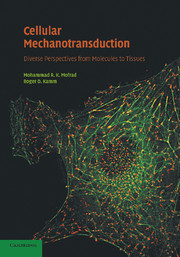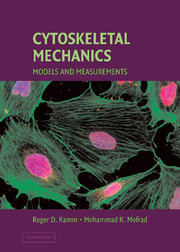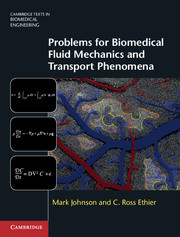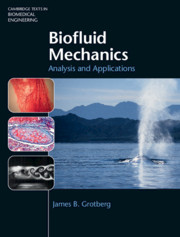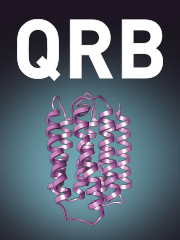Cellular Mechanotransduction
Diverse Perspectives from Molecules to Tissues
- Editors:
- Mohammad R. K. Mofrad, University of California, Berkeley
- Roger D. Kamm, Massachusetts Institute of Technology
- Date Published: July 2014
- availability: Available
- format: Paperback
- isbn: 9781107682467
Paperback
Other available formats:
Hardback, eBook
Looking for an inspection copy?
Please email academicmarketing@cambridge.edu.au to enquire about an inspection copy of this book
-
'Mechanotransduction' is the term for the ability, first described by 19th-century anatomist Julius Wolff, of living tissues to sense mechanical stress and respond by tissue remodeling. More recently, the scope of mechanotransduction has been expanded to include the sensation of stress, its translation into a biochemical signal, and the sequence of biological responses it produces. This book looks at mechanotransduction in a more restricted sense, focusing on the process of stress sensing and transducing a mechanical force into a cascade of biochemical signals. This stress has become increasingly recognized as one of the primary and essential factors controlling biological functions, ultimately affecting the function of the cells, tissues, and organs. A primary goal of this broad book is also to help define the new field of mechanomics, which attempts to describe the complete mechanical state of a biological system.
Read more- Helps define the new field of mechanomics
- Focuses on the process of stress sensing and transducing mechanical force into biochemical signals
- Provides an overview of the mechanical state of a biological system
Customer reviews
Not yet reviewed
Be the first to review
Review was not posted due to profanity
×Product details
- Date Published: July 2014
- format: Paperback
- isbn: 9781107682467
- length: 494 pages
- dimensions: 255 x 177 x 25 mm
- weight: 0.92kg
- contains: 240 b/w illus. 8 colour illus. 4 tables
- availability: Available
Table of Contents
1. Introduction Roger D. Kamm and Mohammad R. K. Mofrad
2. Endothelial mechanotransduction Peter F. Davies and Brian P. Helmke
3. Role of the plasma membrane in endothelial cell mechanosensation of shear stress Peter J. Butler and Shu Chien
4. Mechanotransduction by membrane mediated activation of G protein coupled receptors and G proteins Yan-Liang Zhang, John A. Frangos and Mirianas Chachisvilis
5. Cellular mechanotransduction: interactions with the extracellular matrix Andrew D. Doyle and Kenneth M. Yamada
6. Role of ion channels in cellular mechanotransduction: lessons from the vascular endothelium Abdul I. Barakat and Andrea Gojova
7. Towards a modular analysis of cell mechano-sensing and transduction: an operations manual for cell mechanics Benjamin J. Dubin-Thaler and Michael P. Sheetz
8. Tensegrity as a mechanism for integrating molecular and cellular mechanotransduction mechanisms Donald E. Ingber
9. Nuclear mechanics and mechanotransduction Shinji Deguchi and Masaaki Sato
10. Microtubule bending and breaking in cellular mechanotransduction Andrew D. Bicek, Dominique Seetapun, and David J. Odde
11. A molecular perspective on mechanotransduction in focal adhesions Seung E. Lee, Roger D. Kamm and Mohammad R. K. Mofrad
12. Protein conformational change: a molecular basis of mechanotransduction Gang Bao
13. Translating mechanical force into discrete biochemical signal changes: multimodularity imposes unique properties to mechanotransductive proteins Vesa P. Hytönen, Michael L. Smith and Viola Vogel
14. Mechanotransduction through local autocrine signaling Nikola Kojic and Daniel J. Tschumperlin
15. The interaction between fluid-wall shear stress and solid circumferential strain affects endothelial cell mechanobiology John M. Tarbell
16. Micro- and nanoscale force techniques for mechanotransduction Nathan J. Sniadecki, Wesley R. Legant and Christopher S. Chen
17. Mechanical regulation of stem cells: implications in tissue remodeling Kyle Kurpinski, Randall R. R. Janairo, Shu Chien and Song Li
18. Mechanotransduction: role of nuclear pore mechanics and nucleocytoplasmic transport Christopher B. Wolf and Mohammad R. K. Mofrad
19. Summary and outlook Mohammad R. K. Mofrad and Roger D. Kamm.
Sorry, this resource is locked
Please register or sign in to request access. If you are having problems accessing these resources please email lecturers@cambridge.org
Register Sign in» Proceed
You are now leaving the Cambridge University Press website. Your eBook purchase and download will be completed by our partner www.ebooks.com. Please see the permission section of the www.ebooks.com catalogue page for details of the print & copy limits on our eBooks.
Continue ×Are you sure you want to delete your account?
This cannot be undone.
Thank you for your feedback which will help us improve our service.
If you requested a response, we will make sure to get back to you shortly.
×
